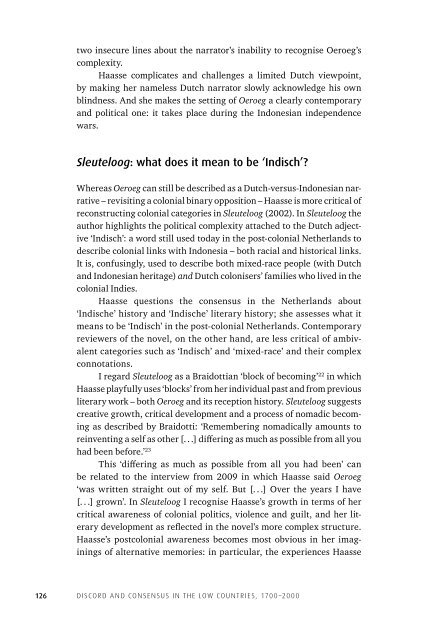Discord Consensus
7aze300jFJo
7aze300jFJo
You also want an ePaper? Increase the reach of your titles
YUMPU automatically turns print PDFs into web optimized ePapers that Google loves.
two insecure lines about the narrator’s inability to recognise Oeroeg’s<br />
complexity.<br />
Haasse complicates and challenges a limited Dutch viewpoint,<br />
by making her nameless Dutch narrator slowly acknowledge his own<br />
blindness. And she makes the setting of Oeroeg a clearly contemporary<br />
and political one: it takes place during the Indonesian independence<br />
wars.<br />
Sleuteloog: what does it mean to be ‘Indisch’?<br />
Whereas Oeroeg can still be described as a Dutch-versus-Indonesian narrative<br />
–revisiting a colonial binary opposition –Haasse is more critical of<br />
reconstructing colonial categories in Sleuteloog (2002). In Sleuteloog the<br />
author highlights the political complexity attached to the Dutch adjective<br />
‘Indisch’: a word still used today in the post-colonial Netherlands to<br />
describe colonial links with Indonesia –both racial and historical links.<br />
It is, confusingly, used to describe both mixed-race people (with Dutch<br />
and Indonesian heritage) and Dutch colonisers’ families who lived in the<br />
colonial Indies.<br />
Haasse questions the consensus in the Netherlands about<br />
‘Indische’ history and ‘Indische’ literary history; she assesses what it<br />
means to be ‘Indisch’ in the post-colonial Netherlands. Contemporary<br />
reviewers of the novel, on the other hand, are less critical of ambivalent<br />
categories such as ‘Indisch’ and ‘mixed-race’ and their complex<br />
connotations.<br />
I regard Sleuteloog as a Braidottian ‘block of becoming’ 22 in which<br />
Haasse playfully uses ‘blocks’ from her individual past and from previous<br />
literary work –both Oeroeg and its reception history. Sleuteloog suggests<br />
creative growth, critical development and a process of nomadic becoming<br />
as described by Braidotti: ‘Remembering nomadically amounts to<br />
reinventing a self as other [. . .] differing as much as possible from all you<br />
had been before.’ 23<br />
This ‘differing as much as possible from all you had been’ can<br />
be related to the interview from 2009 in which Haasse said Oeroeg<br />
‘was written straight out of my self. But [. . .] Over the years I have<br />
[. . .] grown’. In Sleuteloog I recognise Haasse’s growth in terms of her<br />
critical awareness of colonial politics, violence and guilt, and her literary<br />
development as reflected in the novel’s more complex structure.<br />
Haasse’s postcolonial awareness becomes most obvious in her imaginings<br />
of alternative memories: in particular, the experiences Haasse<br />
126<br />
DISCORD AND CONSENSUS IN THE LOW COUNTRIES, 1700–2000


